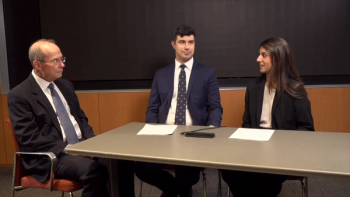
ASRS 2023: Presenters share research from 2023 ASRS annual meeting they find exciting
At the 2023 American Society of Retina Specialists meeting in Seattle, Washington, we asked some of the presenters, "What research here do you find exciting or interesting?" Here's what Ursula Schmidt-Erfurth, MD, Veena Raiji, MD, and Dante Pieramici, MD had to say.
At the 2023 American Society of Retina Specialists meeting in Seattle, Washington, we asked some of the presenters, "What research here do you find exciting or interesting?" Here's what Ursula Schmidt-Erfurth, MD, Veena Raiji, MD, MPH, and Dante Pieramici, MD had to say!
Video Transcript
Editor's note - This transcript has been edited for clarity.
Ursula Schmidt-Erfurth, MD:
What particularly excites everyone are the advances in developing GA therapy. There are multiple therapeutic targets. And there are very many positive signals from different trials using different substances and different approaches. And this is an enormous breakthrough for our patients.
Veena Raiji, MD, MPH:
You know, I think there's a lot of exciting and novel therapeutic interventions for the treatment of intraocular inflammation and uveitis, in particular, novel delivery methods and significant reduction in treatment burden that I think represents the future of ophthalmology, specifically in retina.
Dante Pieramici, MD:
Yeah, I think there's a lot of interesting things going on in our space right now. You know, the, your we're seeing potential treatments for geographic atrophy. But certainly we're also seeing some potential complications that can come from new drugs, things like ocular retinal vasculitis and such. So I think we have to be careful with these new technologies. I'm particularly excited about gene therapy. I think that there's really been proof of concept that this can be used in our patients, particularly our patients with neovascular AMD. And it's really the beginning of the use of gene therapy. So we're seeing models 1.0. And I think that over the years, we'll get better viral vectors, better gene cassettes delivering the material to the eye, and this will be a very relevant approach to treating patients in the next decades to come.
Newsletter
Don’t miss out—get Ophthalmology Times updates on the latest clinical advancements and expert interviews, straight to your inbox.





























